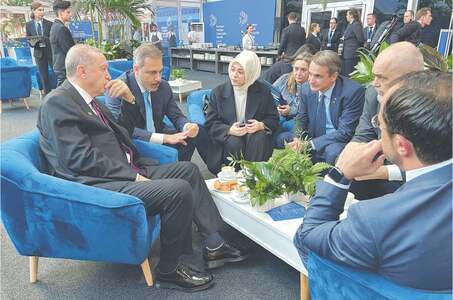BANGKOK: UN envoy Ibrahim Gambari’s seeming failure to press the Myanmar junta toward reform has underlined the loss in diplomatic momentum since last year’s bloody crackdown on protests, analysts say.
Gambari arrived in Myanmar last Thursday hoping to persuade the regime to include detained democracy icon Aung San Suu Kyi in plans for a constitutional referendum in May designed to pave the way for elections in 2010.
But with support from regional allies such as China and the Association of Southeast Asian Nations (Asean), the generals have pressed on with a “roadmap to democracy” that the West has decried as a sham.
“What the Burmese military has done is what the Chinese and Asean and even the Indians wanted to see in Burma the continuation of the roadmap, and for the first time in 20 years there is a timeframe,” said Thailand-based Myanmar expert Aung Naing Oo, referring to the nation by its former name.
Gambari left Myanmar late on Monday having twice been rebuffed by the junta on his third visit there since pictures of last September’s violent crackdown on Buddhist monk-led street protests went around the world.
The generals refused to amend the constitution and rejected an offer of UN technical assistance and foreign observers during the referendum.
At least 31 people died last September, according to the United Nations, although Human Rights Watch has put the toll at more than 100, and the world outcry was swift and unified a consensus that has since fractured.
While China, Russia and some Southeast Asian nations call the referendum a step in the right direction, the United States and other Western countries say it aims to entrench the military’s role.
The constitution would bar Aung San Suu Kyi from elections because she was married to a foreigner, while a new law limits her party’s ability to campaign by criminalising public speeches and leaflets about the referendum.
Aung Naing Oo said the split has left Myanmar holding all the cards, with the United Nations empty-handed.
“I honestly don’t have any hope in the UN’s intervention,” he added. “The Burmese junta know they have the Chinese protecting them at the UN Security Council.”
The apparent snubs to Gambari, who was also accused on this visit of being biased in favour of the opposition, also show the junta is increasingly immune to the fickle demands of the international community, said Zarni, a visiting fellow at Britain’s Oxford University who goes by one name.
“The last thing the regime would want to do is appear to be appeasing the international community, be it the Chinese or the Americans,” he said.
“These guys draw inspirations from such regimes as Cuba, Venezuela, Iran, North Korea etc, which stand up to what they all consider as ‘neo-imperialist’ West.” Gambari did, however, meet Aung San Suu Kyi twice during his visit, a rare contact with the outside world for the Nobel peace prize winner who has spent 12 of the last 18 years under house arrest.
Aung San Suu Kyi led her National League for Democracy party to a storming election victory in 1990, but the military which has ruled Myanmar in some form since 1962 refused to recognise the result.
But the envoy was denied access to senior junta figures, with junta leader Senior General Than Shwe inaccessible in the isolated capital Naypyidaw.
Win Min, a Thailand-based analyst attached to Chiang Mai University, said the only way to bring genuine democratic reform to Myanmar was for the United Nations Security Council to take harsh action unanimously.
“Only then the regime will listen,” he said.
However, Zarni said, Myanmar was no longer top of the world’s agenda.—AFP













































Dear visitor, the comments section is undergoing an overhaul and will return soon.